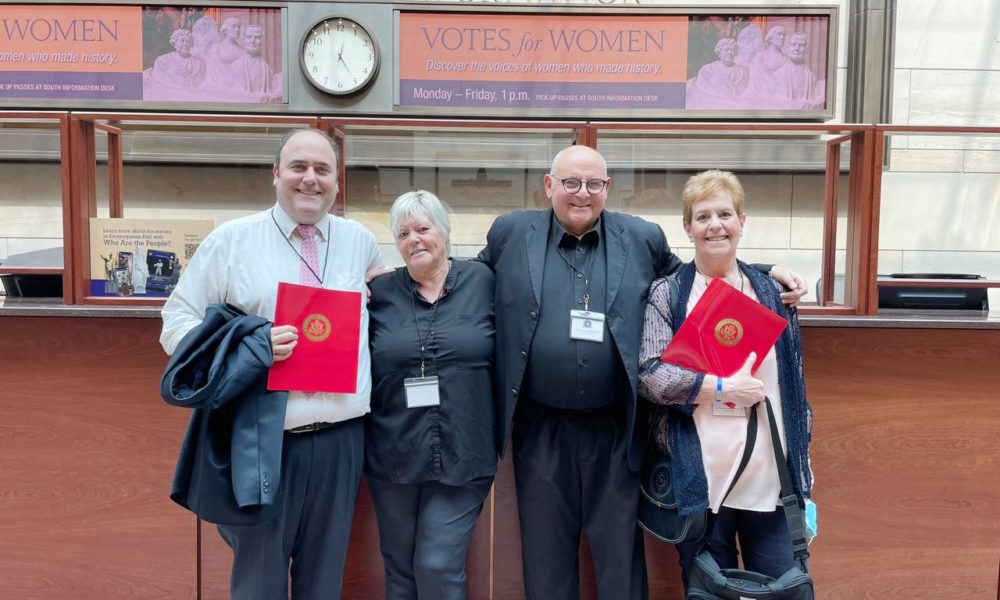News
Antisemitism in SA filters from the top down, Jewish politicians tell US summit

Jewish South African parliamentarians last week challenged executives from social media platforms about what they were doing to combat online antisemitism during an Inter-Parliamentary Task Force to Combat Online Antisemitism hearing in Washington.
The conference was convened by a multinational group of legislators to question representatives of Meta, Twitter, YouTube, and TikTok about the proliferation of antisemitism on their platforms and examine ways to combat it.
For the first time, South African parliamentarians Madeleine Hicklin, Darren Bergman, Michael Bagraim, and Glynnis Breytenbach – all members of the Democratic Alliance – had an opportunity to meet Jewish politicians from around the world to explain antisemitism in the South African context. They detailed the interconnectedness between anti-Zionism and antisemitism as experienced by South African Jewry.
Addressing the hearing, Hicklin told delegates, “The greatest proponents of antisemitism and anti-Israel sentiment comes from our government and because of this, it filters from the top down instead of coming from the bottom up.”
Said Bagraim, “I drew attention to the phrase ‘apartheid Israel’, and explained that in our own personal experience, Israel isn’t an apartheid state.”
He told the hearing, “Antisemites the world over carefully manoeuvre themselves around the definition of antisemitism. It’s important for us to understand that the attack on Israel in every single circumstance is actually a cover-up for an attack on Jews.”
He bemoaned the fact that executives from social media platforms didn’t give him any satisfactory comment on why they allowed “the most horrific attacks on Israel” on their platforms.
Organised by United States Representative Debbie Wasserman Schultz and Canadian Member of Parliament Anthony Housefather, the summit challenged those present to ask hard hitting questions about the evolution and proliferation of online antisemitism.
Bergman told the SA Jewish Report that attending the conference was “definitely worthwhile”.
“It highlighted global online antisemitism statistics and a worrying rising trend. There’s a push and pull for the social media space between good and evil, and justice must prevail.”
He said it was imperative that people educated themselves on the International Holocaust Remembrance Alliance definition of antisemitism and all forms of hate speech directed at minority groups.
Legislators highlighted the need for more transparency, and questioned Neil Potts, the vice-president of public policy, trust and safety for Meta; Michele Austin, the director of public policy for the United States and Canada for Twitter; Kevin Kane, the manager of government affairs and public policy for YouTube; and Eric Ebenstein, the director of public policy for TikTok.
Anti-Defamation League (ADL) Chief Executive Jonathan Greenblatt described online antisemitism as a “global problem” that needed “global solutions”.
“It must be fought aggressively wherever it comes from, and it must be tackled together. This is why this meeting is so important, bringing together legislators from around the world to tackle this common scourge,” he said.
He said ADL data painted a disturbing picture of anti-Jewish racism in America online and on the ground. Its annual Online Hate and Harassment survey shed light on how Americans – especially Jews – experience hate and harassment on social media, including types of harassment, its impact, and how and where they experience this harassment.
“More than a third of Jewish respondents – 37% – reported online harassment during their lifetime. More than a fifth – 21% – of Jewish respondents reported online harassment in the past 12 months,” he said.
“Overall, ADL’s online hate work has highlighted platforms’ failure to adopt adequate content-moderation policies, and where they exist, to enforce them at scale and equitably. This includes a lack of effective proactive interventions by social media companies to address online hate against Jews, and a failure to act when the content is reported.”
According to Jewish Insider, Wasserman Schultz challenged Potts over his company’s slow response times to addressing antisemitic content and its algorithmic amplification of hateful content.
While thanking the executives for appearing before the task force, she said she felt they had failed to grapple with antisemitism as a “viral toxic infection that drives real-world violence”.
Michael Levitt, a former Canadian Member of Parliament and the president of the Friends of Simon Wiesenthal Center, implored the executives of social media companies to “do more and to do it now. The safety and future of our Jewish community depends on it.”
Breytenbach told the SA Jewish Report the conference had been “interesting and educational”.
“Hands-on interaction with representatives of online platforms is something we could look at doing in South Africa, but we would be less aggressive since we’re not close to legislating on the subject,” she said, “however this is something we should explore.”
Said Hicklin, “Meta, Twitter, TikTok, and YouTube are answerable to shareholders more than the Jewish community. The common response to most questions was, ‘We’ll get back to you’ as opposed to giving an unequivocal ‘Yes’ when asked to make a commitment to the eradication of antisemitic and anti-Zionist hate speech immediately.” She found this disappointing.
“If this summit showed me anything, it was that everyone in this room – Republican, Democrat, or any other political party – put ego on the back burner. The eradication of a scourge bigger than ego, bigger than politics, is at stake. We all have to pull together to fight for each other, to fight for one another.”
In a rousing final declaration, Hicklin told delegates that several members of her family were “wiped out in the Warsaw and Vilna ghettoes and Hitler’s concentration camps” during World War II.
She said, “We have gathered here, as legislators, as concerned citizens, as Jews, as human beings, to boldly say, ‘Never again!’ and mean it. I’m a South African Jew, a member of the Democratic Alliance, and I am speak on behalf of many South Africans. I’m saying: ‘Never again!’ We’re saying, ‘Never again!’ It’s up to me. It’s up to you. It’s up to us. Hatred is a learned behaviour. It stops here.”